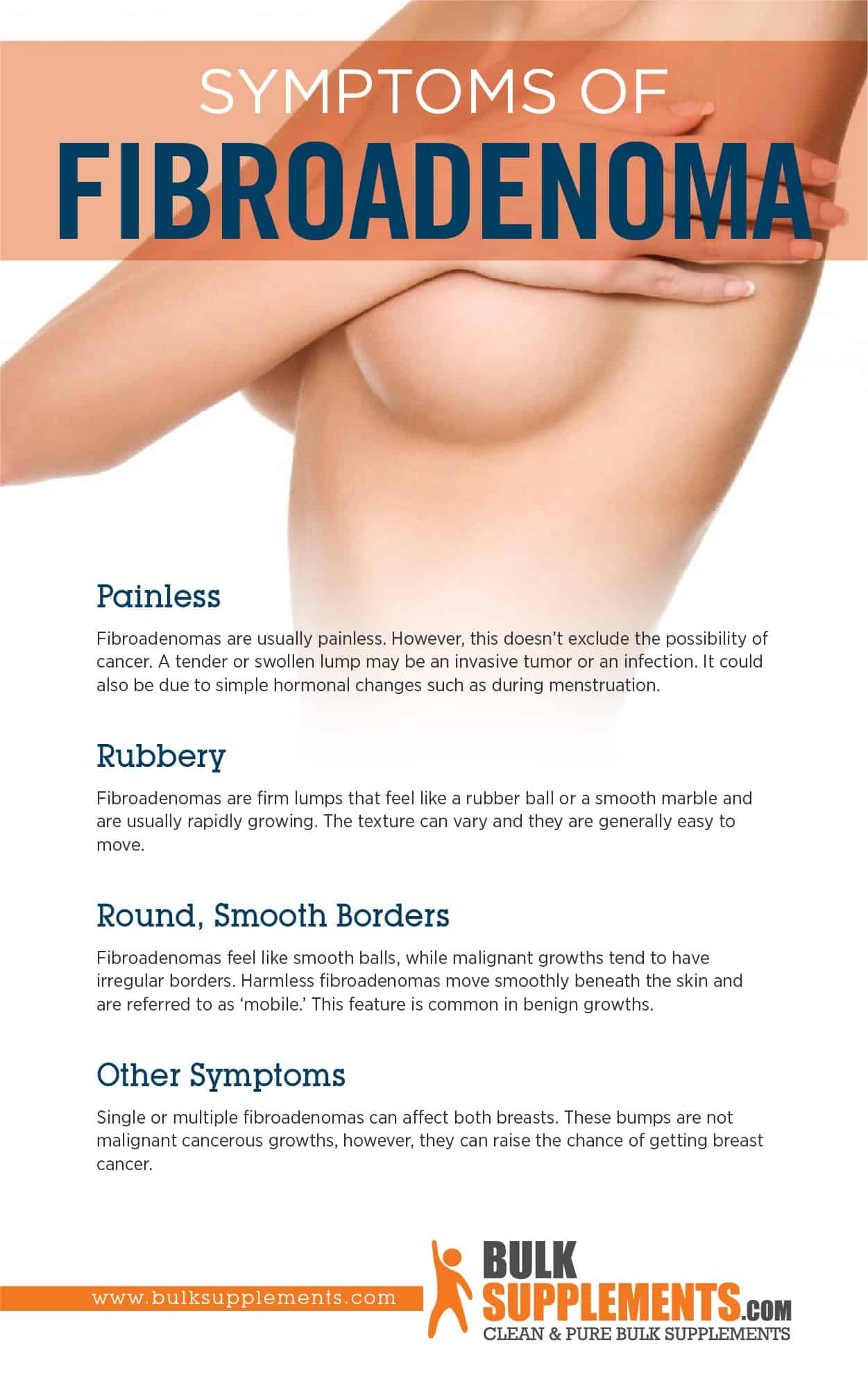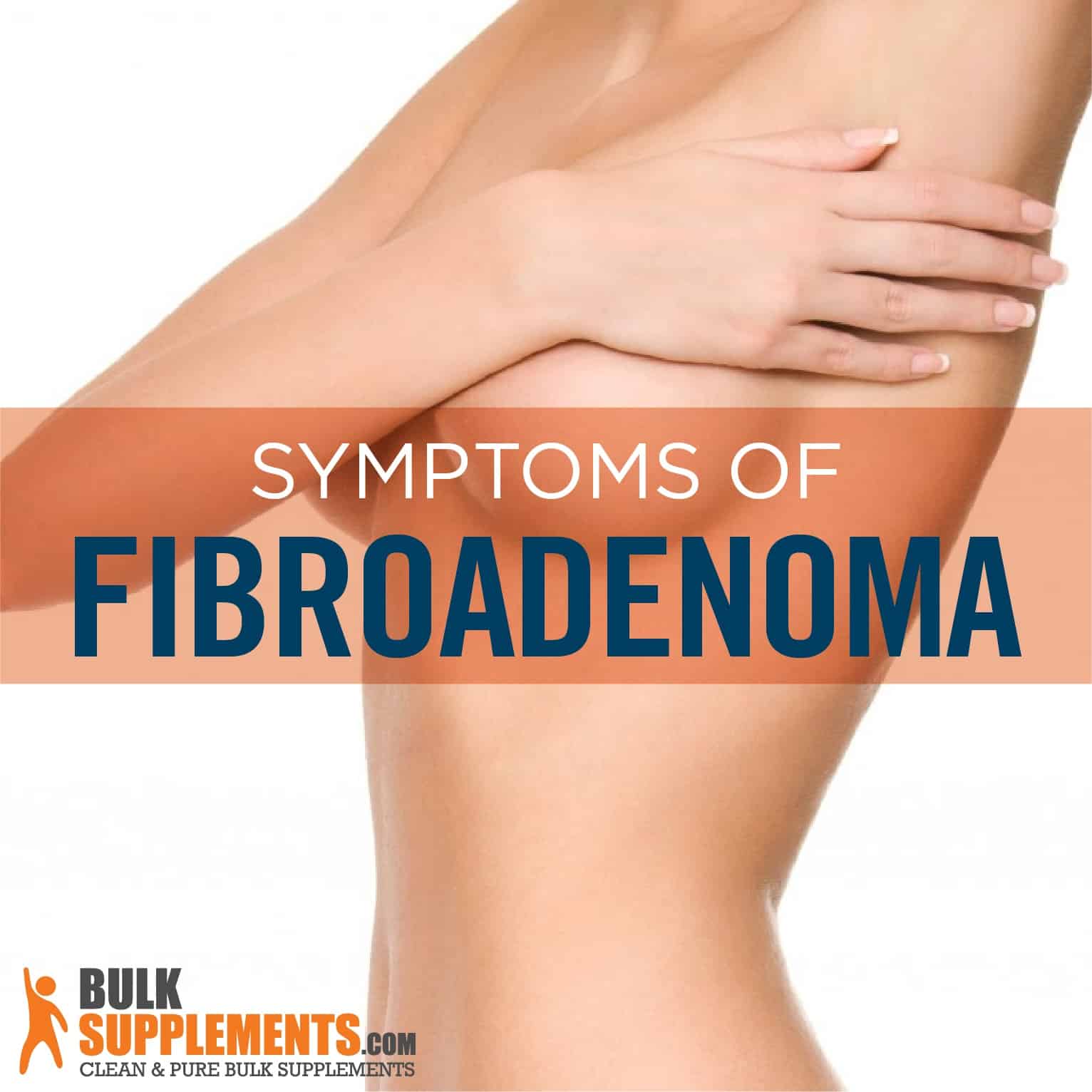Finding a lump in your breast can be scary. Nobody wants to hear the dreaded “C” word. But does every lump and bump mean there’s something sinister going on in your breasts? Several things can cause lumps in your breasts and not all of them are dangerous. Like fibroadenomas, for example.
What are Fibroadenomas?
Fibroadenomas are breast lumps that are not cancerous. These rubbery, round lumps are pretty common, especially in women in their childbearing years. (x) They form glandular and fibrous tissue that usually surface in the breast. (x) Finding something abnormal in your breast can raise some alarm. If you feel anxious or worried, your doctor can conduct tests to determine the nature of the lump, which is a smart idea. (x)
Characteristics of Fibroadenomas
How would you know if you have a fibroadenoma? One way is to perform routine self-exams on your breasts so that you are aware when a new lump or bump appears. It’s impossible to know whether a new breast mass is malignant or benign without a biopsy. But there are some signs that point towards the bump is a fibroadenoma.
- Painless
Fibroadenomas are usually painless. (x) However, this doesn’t exclude the possibility of cancer. A tender or swollen lump may be an invasive tumor or an infection. (x) It could also be due to simple hormonal changes such as during menstruation. (x)
- Rubbery
Fibroadenomas are firm lumps that feel like a rubber ball or a smooth marble and are usually rapidly growing. (x) (x) The texture can vary, and they are generally easy to move. (x)
- Round, Smooth Borders
Fibroadenomas feel like smooth balls, while malignant growths tend to have irregular borders. (x) Benign fibroadenomas move smoothly beneath the skin, referring to as “mobile.” This feature is common in benign growths. (x)
Other Symptoms of Fibroadenomas
Single or multiple fibroadenomas can affect both breasts. (x) These bumps are not malignant cancerous growths. However, they can raise the chance of getting breast cancer. (x)
Causes of Fibroadenomas
The cause of fibroadenomas is unknown but hypothetically thought that hormones influence their growth. (x) They usually occur in menstruating women, growing larger during pregnancy and smaller during menopause. (x)
Fibroadenomas vs. Cancer
For most people, finding an unusual bump raises a red flag for cancer. But most of the time, we grow small lumps and bumps that are merely benign growths of healthy tissue. Fibroadenomas are benign growths of a specific type of tissue belonging to a healthy breast and do not usually lead to cancer. (x) On the other hand, cancer cells are rapidly dividing, abnormal cells that grow uncontrollably and invade the healthy breast tissue. Understandably, you need to be concerned if you feel a lump in your breast. (x)
Types of Fibroadenomas
Different types of fibroadenomas define the size of the lump and the characteristics of the tissue inside. Certain kinds can put you at higher risk of developing breast cancer. (x) Some include:
- Complex Fibroadenomas
Complex fibroadenomas are fast-growing lumps that need diagnoses by examining a piece of the tissue under a microscope. (x) These pose slightly higher risks of developing cancer-based on a study of women who had fibroadenoma and women who did not have fibroadenoma. Women with complex fibroadenoma had a minimal increased risk of cancer. (x)
- Juvenile Fibroadenomas
Juvenile fibroadenomas tend to occur in women under 18 and decrease in size over time. Sometimes, they cause an imbalance between the two breasts, resulting in surgery. (x)
- Giant Fibroadenomas
As the name suggests, giant fibroadenomas are larger than other types and grow to over 5 cm in diameter. They are not cancerous, but the doctor will recommend removing them as they impede other breast areas. Like juvenile fibroadenomas, they can imbalance the two breasts, one being more prominent than the other. (x)
- Phyllodes Tumors
Phyllodes tumors are usually benign and cause breast pain. They are not fibroadenomas but need diagnosis via core needle biopsy to determine whether it’s a tumor or fibroadenomas. However, they may become cancerous. Due to this small risk, doctors will recommend removal. (x)

Remedies and Supplements for Fibroadenomas
Fibroadenoma treatment involves surgical removal, either by surgically removing the growth or having a surgeon freeze it with a unique tool. Without surgical treatment, fibroadenomas do not reduce or disappear. However, they are benign growths and don’t usually lead to cancer. Still, it is crucial to monitor them carefully with your doctor. (x)
While there isn’t a medication that can shrink fibroadenomas, several home therapies help promote breast health and prevent cancer. Some therapies include:
- Turmeric
Turmeric is a popular spice in middle-eastern cuisine used as a cooking ingredient and as a medicinal herb for centuries. Fragrant and delicious, this spice not only has flavorful properties but medicinal ones too. Also known as curcumin, turmeric can help detoxify our bodies and fight inflammation (x).
Not only does it help fight cancer, but it can also relieve pain from inflammatory diseases such as arthritis. (x) The spice also helps prevent breast cancer (x) and relieves pain from periodic breast tenderness with hormonal changes. (x)
The recommended dosage of curcumin is 1,000 mg per day with food and water. Side effects are rare unless you exceed the maximum dose, but some people may get a stomach ache if they have a sensitive stomach. People who are allergic to ginger may want to avoid taking turmeric as both are closely related.
- Iodine
Demographic research shows that Japan and Iceland have low incidences of endemic nontoxic goiter. Endemic goiter is a sign of increased risk of breast cancer. An endemic goiter is a goiter caused by a deficiency of iodine. (x) Japanese women have a low incidence of endemic goiter and breast cancer. They also consume large amounts of seaweed, which is high in iodine. A study performed on rats showed a direct link between iodine-deficient diets and abnormal breast tissue growth. (x) Consult with your physician about taking iodine as a supplement, recommending taking it twice a week.
- Enzymes
Bromelain, a blend of enzymes found in tropical pineapple, has many positive attributes that help your body stay healthy. The enzyme contains proteinases as a proteolytic enzyme, which breakdown proteins and assist in digesting. Bromelain also has anti-cancer components. (x) Studies strongly suggest this enzyme has a direct impact on preventing cancer cells. (x)
Other oral proteolytic enzymes, such as papain, trypsin, and chymotrypsin, have positively affected radiotherapy during cancer treatment. (x) There are also reports of preventing cancer in relationship to their anti-inflammatory appeal. A particular supplement called Wobenzym has a combination of these enzymes, noted as systemic enzymes, in keeping cancer at bay. (x) Still, taking these enzymes with intermittent fasting helps ward off cancer.
A study in 1906 performed on mice with cancer tumors showed that trypsin placed on the cancer cells shrunk the tumor to nothingness. (x)
- Frankincense
Essential oils are another very effective way to prevent or treat benign or cancerous tumors of the breast. The frankincense resin from the Boswellia trees has proven to distinguish cancerous and normal cells, thus suppressing the cancer cell vitality. (x)
A study performed on determining frankincense effectiveness on treating breast cancer proved fruitful with the stress on its cost-effective measures as part of an anti-cancer cocktail. (x)
Historically, this essential oil has a wealth of health-supporting properties. Also, it may treat rheumatoid arthritis and Crohn’s disease. (x)
It’s best to test the oil on your skin before applying it to your breasts. Most essential oil experts recommend adding three drops of frankincense to two teaspoons of coconut oil as a carrier for your breasts, keeping it diluted. (x)
- Other Essential Oils
Juniper oil has the potential of helping to prevent breast cancer. (x) Other essential oils are lemongrass, chamomile, and thyme, to name a few. (x) (x)
- Pomegranate
Pomegranate is a fruit-filled with sweetly tart seeds packed with a compound called polyphenols, which fight cancer. (x) Research shows that drinking pomegranate juice decreases hormones related to developing breast cancer. (x) Both the fruit itself and the extract and juices have anti-cancer properties. (x)
Pomegranate can be eaten as a fruit, drunk in juice form, or taken as a supplement. The recommended dosage of pomegranate is 750 mg twice a day. Side effects are rare, but some people may experience nausea, diarrhea or stomach ache. On rare occasions, pomegranate extract can elevate blood pressure.
- Walnuts
Walnuts are a healthy, energy-fueled snack that can protect you from breast cancer. Not only are they tasty, but they also contain proteins that fight toxins that damage our body and promote cancer. Studies based on test tubes or in vitro show their digestibility and antioxidant activity. (x) Studies found that protein fragments isolated from walnuts could prevent the growth of breast cancer cells in the laboratory. (x) These extracts also help stop free radicals and act
as potent antioxidants. (x)
Another study found that people who ate more walnuts, peanuts and almonds had up to three times lower risk of developing breast cancer (x). Walnuts are a great source of other nutrients, including healthy fats like omega-3, which promote heart health. (x) There aren’t any risks known with consuming nuts unless you’re allergic to them, and symptoms can include shortness of breath, tightening of the throat and a rash. (x) It is essential to recognize an allergic reaction to nuts as these can potentially be fatal. (x)
- Blueberries
Blueberries are filled with antioxidants and help prevent breast cancer and promote breast health. The superfood works by reducing inflammation and neutralizing oxidative toxins that damage the cells. (x) Blueberries are a healthy fruit, and a diet rich in fruits and veggies can decrease fibroadenomas. (x)
Blueberries in their natural form as a fruit or juice or as an extract are good to eat. The recommended dosage for blueberry extract is 800 mg once or twice a day with meals. There are no side effects of taking the blueberry extract. However, they can lower blood pressure, so diabetes patients should consult their doctor before adding the fruit or supplement to their diet.
Where to Buy Supplements for Fibroadenoma or Breast Tumors?
You can purchase these powders and supplements for Fibroadenoma or Breast Tumors at BulkSupplements.com. The company is an industry-leading manufacturer and distributor of pure dietary supplements.
BulkSupplements.com is not just a consumer brand. It also supplies pure ingredients to other food and supplement brands to make their products. All products at BulkSupplements.com are manufactured and tested according to current and proper manufacturing practices.
Are you interested in trying any of these powders or supplements mentioned in this article as a possible solution to helping you with Fibroadenoma or Breast Tumors? Contact BulkSupplements.com to place an order today.
The Bottom Line
Fibroadenomas are growths of glandular tissue that can cause lumps in your breast. These lesions are not cancerous and are relatively common, especially in younger women. Treatment of fibroadenomas includes surgery for removal, but that is usually unnecessary.
Most fibroadenomas don’t increase your risk of cancer, and the doctor might not recommend removing them unless they are causing pain. Fibroadenomas do not naturally disappear. However, several natural remedies and supplements combat the growths, such as essential oils, turmeric, proteolytic enzymes, iodine, pomegranate, walnuts and blueberries.
Taking a positive approach to preventing breast tumors, whether cancerous or benign, is a self-fulfilling journey leading to a healthier outlook on life. Discuss this with your healthcare professional, making sure prevention is prevalent and helpful.
These statements have not been evaluated by the Food and Drug Administration. These products are not intended to diagnose, treat, cure or prevent any disease.


